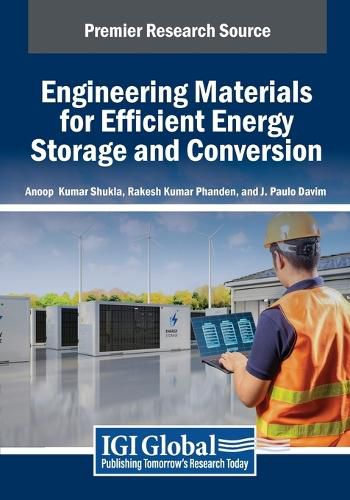Readings Newsletter
Become a Readings Member to make your shopping experience even easier.
Sign in or sign up for free!
You’re not far away from qualifying for FREE standard shipping within Australia
You’ve qualified for FREE standard shipping within Australia
The cart is loading…






This title is printed to order. This book may have been self-published. If so, we cannot guarantee the quality of the content. In the main most books will have gone through the editing process however some may not. We therefore suggest that you be aware of this before ordering this book. If in doubt check either the author or publisher’s details as we are unable to accept any returns unless they are faulty. Please contact us if you have any questions.
As the world grapples with the transition to sustainable energy sources, the demand for materials with high-performance electrodes, electrolytes, and catalysts has become paramount. The energy transition necessitates materials with increased energy and power density for advanced energy storage devices, while the emergence of future fuels like hydrogen requires economically viable electrocatalysts for mass production. In response to these challenges, Engineering Materials for Efficient Energy Storage and Conversion addresses these pressing concerns through an interdisciplinary lens that combines materials science, chemistry, physics, and engineering. Within the pages of Engineering Materials for Efficient Energy Storage and Conversion , a comprehensive exploration unfolds, delving into cutting-edge R&D in energy technologies. The book takes a deep dive into critical areas such as fuel cells, thermal battery materials, hydrogen storage, and materials for thermal management. By providing in-depth insights into the electrochemical, physicochemical, and structural aspects of energy technologies, the book aims to advance functional materials and devices crucial for the sustainable future of energy storage and conversion. This compendium not only presents theoretical frameworks but also offers the latest empirical research findings, contributing significantly to the evolution of the field. The global community must navigate the complexities of sustainable energy solutions, and Engineering Materials for Efficient Energy Storage and Conversion stands as a vital resource for researchers, professionals, and students. By fostering interdisciplinary collaboration and addressing pressing environmental concerns, this book becomes a catalyst for progress in current research on engineering materials. Covering a diverse array of topics from biomaterials to automotive materials, the book is poised to play a pivotal role in advancing sustainable energy solutions. In a world hungry for tangible advancements, directs the collective efforts of those committed to shaping the future of energy materials.
$9.00 standard shipping within Australia
FREE standard shipping within Australia for orders over $100.00
Express & International shipping calculated at checkout
This title is printed to order. This book may have been self-published. If so, we cannot guarantee the quality of the content. In the main most books will have gone through the editing process however some may not. We therefore suggest that you be aware of this before ordering this book. If in doubt check either the author or publisher’s details as we are unable to accept any returns unless they are faulty. Please contact us if you have any questions.
As the world grapples with the transition to sustainable energy sources, the demand for materials with high-performance electrodes, electrolytes, and catalysts has become paramount. The energy transition necessitates materials with increased energy and power density for advanced energy storage devices, while the emergence of future fuels like hydrogen requires economically viable electrocatalysts for mass production. In response to these challenges, Engineering Materials for Efficient Energy Storage and Conversion addresses these pressing concerns through an interdisciplinary lens that combines materials science, chemistry, physics, and engineering. Within the pages of Engineering Materials for Efficient Energy Storage and Conversion , a comprehensive exploration unfolds, delving into cutting-edge R&D in energy technologies. The book takes a deep dive into critical areas such as fuel cells, thermal battery materials, hydrogen storage, and materials for thermal management. By providing in-depth insights into the electrochemical, physicochemical, and structural aspects of energy technologies, the book aims to advance functional materials and devices crucial for the sustainable future of energy storage and conversion. This compendium not only presents theoretical frameworks but also offers the latest empirical research findings, contributing significantly to the evolution of the field. The global community must navigate the complexities of sustainable energy solutions, and Engineering Materials for Efficient Energy Storage and Conversion stands as a vital resource for researchers, professionals, and students. By fostering interdisciplinary collaboration and addressing pressing environmental concerns, this book becomes a catalyst for progress in current research on engineering materials. Covering a diverse array of topics from biomaterials to automotive materials, the book is poised to play a pivotal role in advancing sustainable energy solutions. In a world hungry for tangible advancements, directs the collective efforts of those committed to shaping the future of energy materials.